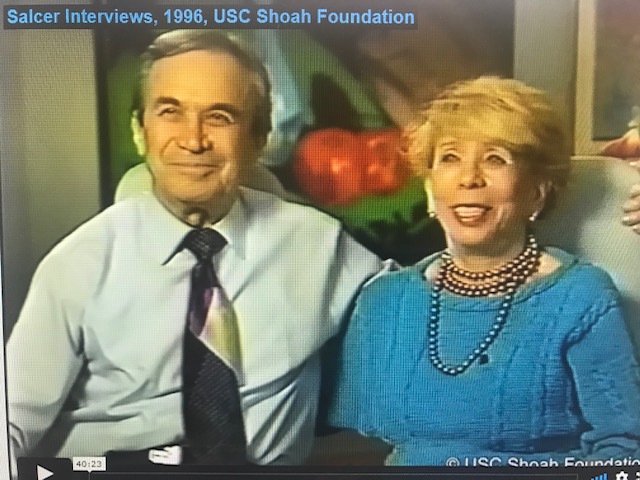By Mike Tenbusch | August 13, 2021
In our most recent book club meeting, I was floored by the memories of Ron Salcer about his parents, Kati and Willi Salcer, two survivors of the Holocaust. Ron’s parents never discussed their experiences until he was a young man and went to see the movie, Schindler’s List, against his father’s advice.
Then, DZ Stone, the author of the book about their incredible journey, No Past Tense, reflected on the Salcers in a way that resonated so deeply with me that I want to share it with you. She said:
I wasn’t quite sure what to make of No Past Tense being a selection of a book club associated with International Samaritan, an organization committed to breaking the chains of poverty for those living in garbage dump communities.
I thought, “What could the lives of Kati and Willi Salcer, two Czech Jews who survived the Holocaust as teenagers, possibly have to do with people living in poverty and scavenging an existence in garbage dumps?”
Then, I read a little about garbage dump communities and what initially struck me was how these people were highly stigmatized by people outside of their communities, often shunned, and derisively referred to with terms such as being called the local rats. Local rats. When I read this phrase, I immediately thought of Kati Salcer as a young girl in Auschwitz about to be disinfected and having her hair shaved off.
During our interviews she talked quite a bit about a young girl, a beautiful young girl with Shirley Temple curls who was having her hair shaved off and was crying out, “Why do you do this? Why do you do this!” And then an SS man standing nearby said, “To get rid of your filthy Jewish fleas.”
Kati said she couldn’t quite articulate to me what it was like to be a young girl and to be treated so degradingly, as less than human, like vermin. And this treatment continued until she was liberated from the work of the labor camp in Lichtenau. It was a horrible experience that took away her humanity. Willi Salcer felt the same. In fact, since liberation, a major goal in his life was to try to take back what the Nazi’s took from him and all Jews: his dignity. That was of paramount importance to him.
But exactly how does a person reclaim and retain their dignity? This was something I discussed with the Salcers many times. And for Kati and Willi, it was part working hard, always working hard to get ahead. And it was combined, however, with an attitude that when life knocks down, you get up and you start all over again. There’s nothing you can’t do if you put your mind to it.
…The Salcers’ life had remarkable ups and downs. When they came to America, they lost all their savings by investing in the stock market on margins… They were in their mid 30’s, with young children, and they had nothing, and they had to start all over again. And they did.
How exactly were they able to do this, to start all over again? One reason that they talked about, especially Kati, was because of confidence. They believed in themselves and in each other and they would bolster each other’s confidence. As Kati remarked to me one day, or actually she did it quite a bit, she would have a little smile and she goes, “You know, a person can do a lot with a little confidence.”
But however, lifting themselves out of poverty and dire circumstances was not simply because they worked hard, they sought to reclaim their dignity, and they had confidence…
For them, what was extremely important was that both their families valued education. That was one thing that during the Holocaust, they could strip them of their belongings, they could take away their families, they could torture them in some way, but they couldn’t take away their education. Their education was of paramount importance to them–and for their families of course.
Hard Work. Dignity. Confidence. Education.
Kati and Willi, through the voices of Ron and DZ, spoke so deeply to us in the club that I wanted to share it with you. Through your giving, and your prayers, and your running in the IntSam Global 5K, you are bringing these values and tools to life in our scholars and their families–and helping to break the chains of poverty in lasting and powerful ways.
Willi and Kati Salcer in 1996. Click on the picture to see their interview with the USC Shoah Foundation.
A New Life in the New Year
By Mike Tenbusch | December 28, 2022 Daniel Castelanos has not had an easy life. He was abandoned at the dumpsite in Tegucigalpa when he was nine years old. For two years, he slept on a piece of cardboard in the dump and foraged through trash for food to eat each...
Christ the King!
By Mike Tenbusch | December 21, 2022 When our Board of Trustees voted last January to make “Water” one of our goals for the year, it was a “gulp” moment for us. We knew that we were going to be stretched and running hard all year long simply to raise the $2.4 million...
What Makes Christmas Special?
By Mike Tenbusch | December 16, 2022 We asked our scholars that question, and thought you might enjoy seeing some of their responses and favorite memories from Christmas... Thank you for being a part of their celebration. If you would like to make a final gift to our...

